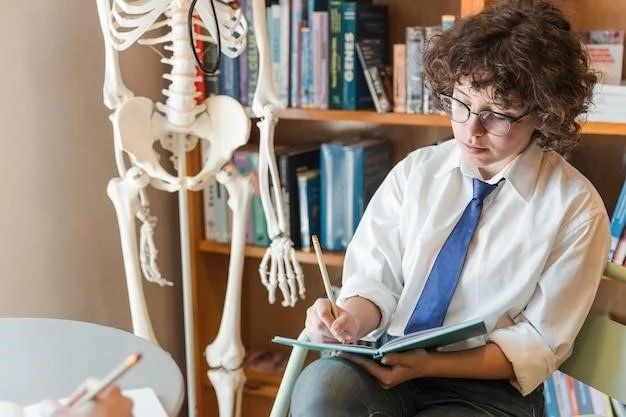Overview of Calderon-Gonzalez-Cantu Syndrome
Learn about this rare genetic disorder affecting bone development. Understand the key aspects from causes to available resources.
Description⁚
Calderon-Gonzalez-Cantu Syndrome is a rare skeletal disorder characterized by dwarfism, joint deformities, and distinctive facial features. Individuals with this condition often have short stature, bowing of the limbs, and abnormal growth plates. Moreover, they may exhibit intellectual disability and hearing loss. Understanding the physical and developmental characteristics can aid in early identification and appropriate management of the syndrome.
Genetic Causes of Calderon-Gonzalez-Cantu Syndrome
Understand how mutations in the FBLN1 gene lead to the development of this rare skeletal disorder. Stay informed for proactive management.
Gene Mutation⁚
The Calderon-Gonzalez-Cantu Syndrome is primarily caused by mutations in the FBLN1 gene which provides instructions for producing a protein involved in bone development. These mutations disrupt normal bone growth and lead to the characteristic features of the syndrome. Understanding the specific gene mutation is crucial in the diagnosis and management of this rare genetic condition. Researchers continue to study these genetic causes to explore potential targeted treatments and advancements in care.
Symptoms and Clinical Presentation of Calderon-Gonzalez-Cantu Syndrome
Recognize key signs such as dwarfism, joint deformities, distinctive facial features, and growth abnormalities for early detection and management.
Common Symptoms⁚
Individuals with Calderon-Gonzalez-Cantu Syndrome commonly experience dwarfism, joint abnormalities, bowed limbs, distinctive facial features, intellectual disability, hearing loss, and abnormal growth patterns. Recognizing these prevalent symptoms is essential for timely diagnosis and treatment planning. Seeking medical expertise for a comprehensive evaluation can help manage the condition effectively.
Diagnosis and Differential Diagnosis of Calderon-Gonzalez-Cantu Syndrome
Consult a medical professional for a comprehensive evaluation to confirm the presence of this rare genetic disorder.
Diagnostic Tests⁚
Diagnosing Calderon-Gonzalez-Cantu Syndrome involves clinical evaluation, genetic testing to identify FBLN1 gene mutations, imaging studies like x-rays to assess bone abnormalities, and developmental assessments to monitor growth patterns. Differential diagnosis may include similar skeletal dysplasias, necessitating a multidisciplinary approach for accurate identification. Seeking specialized medical care and genetic counseling can facilitate prompt diagnosis and individualized treatment planning.
Treatment Strategies for Calderon-Gonzalez-Cantu Syndrome
Collaborate with a specialized healthcare team to develop personalized interventions focusing on symptom management and quality of life enhancement.
Medical Interventions⁚
Management of Calderon-Gonzalez-Cantu Syndrome may include orthopedic interventions for skeletal abnormalities, physical and occupational therapy to support mobility, hearing aids for hearing loss, educational support for intellectual disability, and ongoing monitoring of growth and development. Surgery may be considered for severe complications like spinal curvature. Collaborating with specialists can provide comprehensive care and tailored treatment plans to address the unique needs of individuals with this rare genetic disorder.
Prognosis and Complications of Calderon-Gonzalez-Cantu Syndrome
Understand the potential challenges and seek ongoing medical support for managing complications and optimizing long-term outcomes.
Outlook⁚
The overall outlook for individuals with Calderon-Gonzalez-Cantu Syndrome varies depending on the severity of symptoms and the presence of complications. Early diagnosis and a multidisciplinary approach to care can improve quality of life and potentially mitigate some challenges associated with the condition. Ongoing research and advancements in medical interventions offer hope for enhanced treatment strategies and improved outcomes. Maintaining regular follow-ups with healthcare providers and accessing support services can contribute to better long-term health and well-being.
Research Advances in Calderon-Gonzalez-Cantu Syndrome
Stay informed about the latest studies and breakthroughs to explore innovative treatments and improve the management of this rare genetic disorder.
Current Studies⁚
Ongoing research in Calderon-Gonzalez-Cantu Syndrome focuses on genetic mechanisms, targeted therapies, and improving diagnostic techniques. Clinical trials aim to evaluate potential treatments to address specific symptoms and complications of the condition. By participating in research studies and clinical trials, individuals with this syndrome can contribute to the advancement of medical knowledge and potentially benefit from emerging treatment options. Staying informed about current research developments can guide healthcare decisions and offer hope for future advancements in managing the disorder.

Supportive Care and Resources for Calderon-Gonzalez-Cantu Syndrome
Explore available support networks and resources to help manage the challenges associated with this rare genetic disorder effectively.
Support Networks⁚
Support networks for Calderon-Gonzalez-Cantu Syndrome offer invaluable emotional support, information sharing, and community connections for individuals and families facing this rare genetic condition. Online forums, local support groups, and patient advocacy organizations can provide a sense of belonging, educational resources, and a platform to exchange experiences and insights. Connecting with these support networks can help individuals navigate the challenges of the syndrome, access relevant information, and find comfort in a community that understands their unique circumstances.
